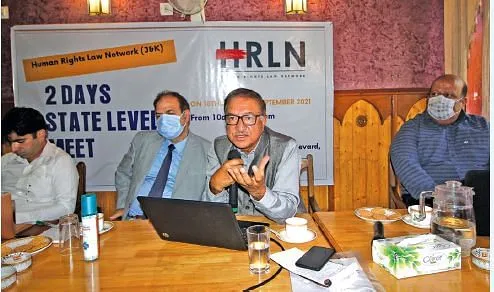Srinagar: Jammu and Kashmir will have no water problem till 2060 but we need to work on making water governance efficient, said Prof Shakeel Romshoo, Vice Chancellor, Islamic University of Science and Technology.
Romshoo said this while delivering the inaugural speech on Saturday at the first day of a two-day meet jointly organised by Human Rights Law Network, an organisation working on social issues, and Srinagar-based People’s Environmental Council.
“There are more than 15000 glaciers across J&K and Ladakh and where we live, this place is also known as part of the water tower of Asia. The per capita water availability in both the UTs is highest in south Asia and we will not have any water problem till 2060. Beyond that it will also be manageable but we need to work to make water governance more efficient,” Romshoo , who was formerly Dean Research at Kashmir University, said.
He said the glacier waters from this region provide for 85 per cent of the irrigated waters of Pakistan.
“There is sufficient water in J&K and Ladakh but we often hear that people don’t get round-the-clock water supply in many parts, especially in towns and cities” said Romshoo.
Romshoo said the problem of water shortage being faced by people is “not one related to water supply. As a part of the Indus Water Treaty, our neighboring country is getting enough water supply. I think people not getting water supply here is a problem arising out of poor water infrastructure for which we need better water governance.”
Commenting on the environmental degradation, Romshoo said: “We have clear evidence and impacts of the environment being degraded. This is impacting the livelihoods of people. Be it water bodies, air quality or flooding, all these are interlinked and interconnected and have a direct impact on people’s livelihood. We have treated the ecosystem with callousness but now need to manage it scientifically to restore water bodies and improve air quality,” Romshoo said. “As far as disaster vulnerability, such as that of earthquakes, is concerned, it is also a big concern. The government, people and other stakeholders need to pay attention to the environmental issues and awareness needs to be created,” Romshoo said.
Also speaking at the event during a power point presentation regarding 2014 floods vis-à-vis Srinagar city, Convenor and Head of J&K INTACH chapter, Muhammad Saleem Beg said Kashmir had a history of witnessing major floods dating back to several centuries. He said the2014 floods in Kashmir was the first “properly documented flood” where we had complete information of water levels and the impact of flooding. Beg said Kashmir had witnessed a “complete collapse of social system, institutional mechanism, tools of governance” due to the floods. “Floods are not just an issue of water, it is a matter concerning economic and health security and a matter of life. It is a psychological issue” Beg said. He said the destruction caused by the 2014 floods is multi-dimensional and will remain in our memories for years to come. “ It is not that we were not aware that we will have floods but we were not prepared for it” Beg said. Commenting on the way forward, Beg said the flood related issue is not just about an engineering issue or a relief and rehabilitation but a larger issue. “It is a larger issue and an issue of our survival. We need a broad-based plan in the future to face any flood situation. Floods don’t originate from Srinagar but begin from catchment areas. Floods are not just destruction caused by river Jehlum but 24 catchments where there are streams and small water bodies and these catchments have witnessed large-scale encroachments, deforestation”. Beg said people indulging in agriculture and horticultural activities in these catchment areas had a negative impact. “ We need a long-term plan if we want to secure Kashmir from floods.
Floods are a reality, a phenomena and there is no escape route from it. We can rather have some sort of mitigation measures institutionally and individually, infrastructure wise and rehabilitation wise a lot needs to be done for handling floods but unfortunately we have not learnt lessons from 2014 floods” Beg said. He said destruction of wetlands and drainage systems along with encroachment of catchments was proving to be dangerous for the ecology of Kashmir and we must tackle it on war footing.
Among others who spoke at the event includes Mian Javed, Environmentalist, Chief Executive Director, Wular Conservation & Management Authority and Mushtaq Pahalgami who is an activist.
Meanwhile, the second half of the seminar on Saturday saw deliberations made on health care requirements in Jammu and Kashmir. Senior medicos and health department officials presented their point of view on issues such as Covid-19 and its impact, rural health care in Jammu and Kashmir, diseases trends, drug abuse and government policies. The second day of the seminar on Sunday will witness deliberations on gender justice and disability rights.






